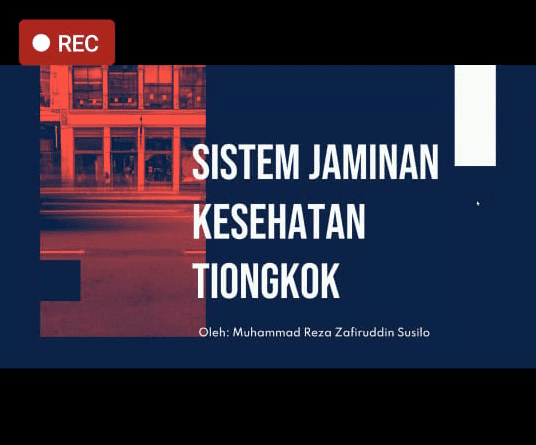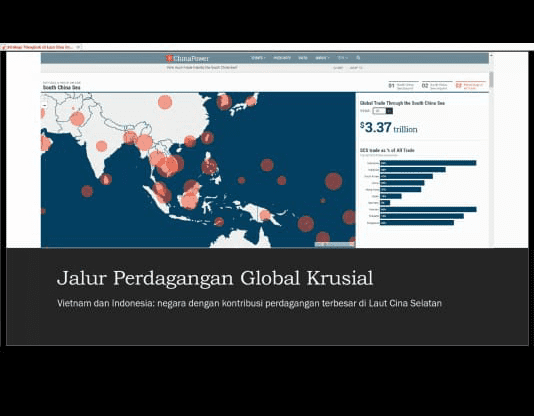
Yogyakarta, May 15th 2020 – Beyond the Great Wall brought an issue about the strategies that done by China in facing the health and security challenges. This issue was brought because of the condition of the China that not only just facing the COVID-19 pandemic, but also the South China Sea dispute that has not ended yet. To explain these two things, Beyond the Great Wall presented Fadhil Sulaeman, Head of Research and Development of SABRI UGM, that would talk about ‘China’s Strategies in the South China Sea’. And there was Muhammad Reza, Media Analyst of the PT. Indonesia Indikator, that would explain a topic about ‘Health Insurance System in China’. This Beyond the Great Wall, which used the online method for the first time, conducted through Google Meet platform.
Institute of International Studies or IIS of International Relations UGM came back with the eighth episode of Beyond the Great Wall series. Beyond the Great Wall was a bi-monthly academic forum that specifically provided space for the academics to discuss about domestic politics, international relations, socio-culture, and other issues that are happening in China. Beyond the Great Wall also gave a chance for the researchers, students, or the other professionals to present their researches, their writings, or book reviews and journal articles that related to China.
The room of Google Meet already opened 30 minutes earlier before the event was started. At 03.30 p.m., the discussion was opened by Lucke Haryo, the Library Staff of IIS, as the moderator. The discussion was opened with an opening speech by Dr. Nur Rachmat Yuliantoro, a lecturer of International Relations UGM. He said that, this moment of Beyond the Great Wall series was perfect, because China is in the spotlight of COVID-19 pandemic and the South China Sea.

Then the discussion was continued with the explanation from Fadhil Sulaeman that explained about China’s strategies in the South China Sea. The South China Sea or SCS is a very crucial global trade route. Because it is the source of gas, crude oil, and fishes. The SCS also became a transnational criminal route of narcotics trading, human trafficking, antiques, and counterfeit goods. To maintain its sovereignty over the SCS, China run several strategies and projects, aimed at both the ASEAN countries and the United States.
Spratly Islands was one of the China’s strategies. There were human-made islands, especially located in the Southeast Asia. This islands became the civil and military bases that equipped with defense and attack systems. The defense and attack systems in the Spratly Islands were radar coverage which is useful for detecting all of the flights that passing through the islands; missiles coverage for air defense which is useful to protect all of the China’s bases in the SCS from air attacks; anti-ships missiles coverage which is useful to sink the ships that passing by through the SCS; and the range of aircrafts in which all of the ASEAN countries’ capital cities were included in the Chinese airstrikes from the SCS.
The other strategies that run by China was through the Paracel Island. Through Paracel Island, China was trying to take Vietnam as a hostage, so that Vietnam could not make policies that against the Chinese hegemony. It could be said that the strategy of Paracel Island became the main threat for Vietnam. China also run their strategies through Scarborough Shoal, the first island chain strategy. The existence of Scarborough Shoal, according to China, was important to be controlled because it opened an option to pre-emptive attack or attack first before being attacked.
Meanwhile, to fight the American hegemony, China was trying to increase the strength of its navy to match the strength of America. China also tried to expand its economic and political influence in all over the world. This strategy was born because there was a different point of view between China and the United States of America. America believed in navigation-free rights—no need to report, free to cross the South China Sea. But China believed in the rights of innocent passage—compulsory reporting and the limited movement in the SCS. It caused confrontation between the two parties in the SCS because the American warships sailed and moved zigzag in the area that considered to be the territorial of China, without reporting first.
The discussion was continued with the explanation of the second topic from Muhammad Reza, the topic was health insurance system in China. In the beginning, China adopted a health insurance system that most of the health costs were subsidized by the state. But, since 2015, there was a change in the policy; the distribution of the health insurance costs was borne by the people. There were three health insurance payment subsidy in China, there were urban employment based-basic for the workers in the urban areas, urban resident basic medical insurance for the students and elderlies, and the ‘new cooperative medical scheme’ for the rural resident.
Related to this COVID-19 pandemic, Chinese officials were planned to modernize the health technological systems as an anticipatory step. This health technological systems were expected to predict the pandemic more accurately in the future. A huge fund allocation were done to fix the health insurance system in China. Even so, the improvement of health services quality, public hospital reformation, improvement of resources in health system, and the integration between health services and funding system were also needed.
Throughout the explanation, participants that had questions could ask through the chat column. After the second topic explanation, those questions were answered one by one by the speakers. The participants also asked enthusiastically and the question and answer sessions were done in three sessions. As the closing of this discussion, the moderator allowed the speakers to deliver their closing statements. The discussion was officially ended around 05.00 p.m.
